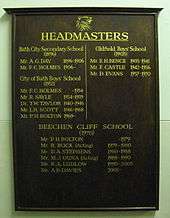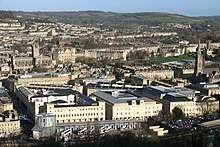Beechen Cliff School
Beechen Cliff School is a boys' secondary school in Bath, Somerset, England, with about 1,150 pupils. Its earliest predecessor school was founded in 1896.
| Beechen Cliff School | |
|---|---|
 | |
| Address | |
Alexandra Park, Kipling Avenue , , BA2 4RE England | |
| Coordinates | 51.3723°N 2.3600°W |
| Information | |
| Type | Academy |
| Established | 1896 (predecessor school) |
| Specialist | Technology |
| Department for Education URN | 136520 Tables |
| Ofsted | Reports |
| Chair of Governors | Nigel Stevens (acting) |
| Headmaster | Andrew Davies |
| Gender | Boys (Coeducational sixth form) |
| Age | 11 to 18 |
| Enrolment | 1,325 (2017) |
| Colour(s) | |
| Former name | City of Bath Boys' School |
| Website | http://www.beechencliff.org.uk/ |
There are around 930 boys in years 7 to 11 and a co-educational sixth form of 402 pupils.[1] The school offers the option of state boarding. It is located just south of the city centre near Alexandra Park, up a hill from Bear Flat on the A367, a major route from the south of the city into Bath.
History

The school began in 1896 as Bath City Secondary School in the Guildhall.[2][3]
It moved from the Guildhall Technical College[4] to its present site at Beechen Cliff in 1932 when it was renamed the City of Bath Boys' School.[5]
It changed to its present name in 1970 when the City of Bath reorganised secondary education. The grammar school was amalgamated with Oldfield Boys' School, a local secondary modern school founded in 1903, to form a comprehensive school.
On 7 August 1988, on a school climbing expedition in the Briançon region of the French Alps, the 57-year-old headmaster Donald Stephens fell 300 feet (91 m) to his death. Fifteen pupils and three members of staff were on the expedition, training for a walk up Mount Kenya, and witnessed the tragic incident. A library has been established in his memory.

A review of Bath secondary provision by Avon County Council in the 1980s proposed that the school be closed and replaced with a sixth form college on the same site serving the whole city. Partisans of the school, however, took advantage of new legislation to obtain grant-maintained status for the school, taking it out of local authority control, which the then Government permitted despite a policy that schools would not be allowed to use grant-maintained (GM) status as a way of avoiding closure.
In February 1990 Avon County Council took the Secretary of State for Education and Science, John MacGregor, to the High Court to prevent the school gaining GM status and thus fatally undermining its Bath schools reorganisation plan; on 24 February Mr Justice Hutchison ruled in favour of the council, obliging the Secretary of State to reconsider his decision. On 30 March the Minister accordingly reconsidered his decision, but came to the same conclusion as before, that the school should be GM funded. In a vote, 55% of parents supported the change of status.[6] At a further judicial review hearing by the High Court on 15 May, Lord Justice Mustill upheld the Minister's decision. The Director of Education at Avon, Dr Christopher Saville, said he was 'very disappointed'.
Former pupil and winner of the 1993 Nobel Prize in Physiology or Medicine for the discovery of the mechanism of gene-splicing, Richard J. Roberts, donated a substantial part of his prize money to help the school build a new science centre, called the Richard Roberts Science Centre.[7]
Beechen Cliff School acquired the specialist school status of Technology College in 1997, and with the demise of grant-maintained status became a Foundation school with similar characteristics in the early 2000s.[8] In 2008 the school was awarded Trust school status.[8][9] In 2011 it became an Academy School, and along with Hayesfield School for girls, Ralph Allen School, Three Ways School (special education) and Wellsway School (in Keynsham) it constitutes the Bath Education Trust, whose governors include representatives of Rotork Ltd, the University of Bath and Bath Spa University.
Since 2014 the school has offered boarding places for boys at the school.[10]
In July 2018 the school was severely criticised following an unannounced Ofsted inspection, which downgraded its rating for overall effectiveness from outstanding to inadequate. The report was particularly critical of the handling of a serious safeguarding incident earlier in 2018 in which pupils chained a black pupil to a lamppost and whipped him in a "mock slave auction", and of the effectiveness of the leadership and management. The report stated the school was misusing extended study leave as a form of unlawful exclusion. The chair and vice chair of governors resigned. The inspection had been unannounced because the Chief Inspector of Schools had concerns about safeguarding, leadership and the quality of education at the school.[1][11][12] The headmaster had decided to expel three of the seven pupils involved, but a panel of three governors in a disciplinary hearing decided the three pupils should not be permanently excluded.[13] The police investigated the "mock slave auction" incident, and seven pupils admitted involvement in a hate crime, two undergoing a restorative justice "community resolution process" involving the victim.[14][15]
In September 2018 the Schools Adjudicator found that the school's admission policy was unreasonable and unfair, stating that the "school has a less deprived intake than the other state-funded schools in the city" due to rules such as giving priority to siblings of Hayesfield Girls' School pupils, allocating 40% of places to children living in the more affluent areas north of the River Avon and 20% to children living outside Bath. The Adjudicator ordered changes to 16 aspects of the school's admissions policy.[16][17]
Environment
In the early 1930s the main building was built on the site of Lyncombe Hill Farm to enable the move from the Guildhall.[8]
In the early 1970s sixth form, science, technology, humanities and sports buildings were built on the eastern playing fields to support the merger of schools into a comprehensive school.[8]
In 1983 an avenue of elm trees, which ran within an ancient hedge along the road to the south of the lower playing fields, contracted Dutch elm disease and had to be felled; replacement trees of different species were planted by subscription of local residents, though not all survived to maturity. In 2000 the school proposed to sell off the lower part of its playing fields for housing development. Although the latest school inspection report had remarked that the playing fields were small for the school,[18] the required consent was obtained from the DfEE, but there was vigorous opposition from the local community and planning permission was refused.[19]
In 1997 the science building was extended, part funded by former pupil Sir Richard J. Roberts from his Nobel Prize award,[7] and the arts building relocated into a new building enabling improvements to the canteen.[8]
Partnerships
Beechen Cliff is home to schoolboys on the full-time training model at Southampton. Beechen Cliff and Bath Rugby have an Academic and Sporting Excellence (AASE) programme at the school and play in RFU’s National AASE League.
The school is home to Bath Theatre School and together have a musical theatre partnership that puts on a production once and year.
Outdoor Education
The school takes part in a number of annual challenges that in the Centurion Challenge (a 100 mile walk from Bath to Hungerford and back in 48 hours), Duke of Edinburgh, Ten Tors (teams complete hikes of up to 55 miles across Dartmoor), 100 mile Coast to Coast Cycle ride across Devon and the Three Peaks Challenge.
The Centurion Challenge is an annual long-distance event organised by Beechen Cliff School, Bath. The event is open to pupils of the school and usually takes place on the first weekend of July. The objective of the challenge is to walk/run 100 miles in 48 hours.
Uniform
The school uniform consists of a blazer, trousers, shirt and a blue tie with sky blue, red, purple, green or yellow house stripes.
Notable alumni
- Zak Vyner, Football player on loan at Rotherham United from Bristol City
- Freddie Burns, Rugby Union player at Bath Rugby
- Billy Burns, Rugby Union player at Ulster Rugby
- Danny Byrd, musician, and producer
- Adam Campbell, actor[20]
- Jason Dodd, Director of Southampton F.C. youth academy[21]
- Jason Gardener,[22] gold medal winner in the Men's 4 × 100 metres relay at the 2004 Summer Olympics
- Gabriel Hamer-Webb, Rugby Union player at Bath Rugby [23]
- David Lassman, author, arts journalist and scriptwriter[24] A room was named after Lassman in the school's new English Centre, along with other notable alumni, including Curt Smith, Andrew Lincoln and Arnold Ridley.
- Andrew Lincoln, actor[25][26] A room was named after Lincoln in the school's new English Centre, along with other notable alumni, including Curt Smith, David Lassman and Arnold Ridley.
- Charlie McDonnell, musician and vlogger[27]
- Dan Rivers, ITV News Correspondent (formerly with CNN and CNN International) [28]
- Curt Smith, musician (Tears for Fears)[26][29] A room was named after Smith in the school's new English Centre, along with other notable alumni, including David Lassman, Andrew Lincoln and Arnold Ridley.
- Tony Spreadbury, rugby union referee[30]
- Paul Tisdale, manager of Exeter City football club[31]
- Amy Williams, gold medal winner in the skeleton at the 2010 Winter Olympics, the first British individual Winter Olympics gold medal since 1980[32]
City of Bath Boys' Grammar School
- Roy Ascott, artist and President of the Planetary Collegium[33]
- Sir Roger Bannister, first man to run a mile in less than 4 minutes[26][34][35]
- Raymond Leppard CBE, musician and conductor[36]
- Rt Rev Christopher Morgan, Bishop of Colchester since 2001[37]
- Robert Orledge, scholar of early twentieth century French music[38]
- Arnold Ridley, Dad's Army actor and playwright[7] A room was named after Ridley in the school's new English Centre, along with other notable alumni, including Curt Smith, Andrew Lincoln and David Lassman.
- Sir Richard J. Roberts, 1993 Nobel Laureate[39]
- Sir John Sawers, Chief of the Secret Intelligence Service (MI6), Ambassador to the United Nations 2007-9[40]
- Sir Graham Watson, Liberal Democrat MEP and leader of the Liberal Democrats in Europe[26]
References
- Beechen Cliff School, 22–23 May 2018 (PDF) (Report). Ofsted. 3 July 2018. Retrieved 3 July 2018.
- "Plan for sites adjoining the Guildhall (Technical Schools) 14 March 1891". Central Library Collection. Bath in Time. Archived from the original on 2 March 2012. Retrieved 20 November 2010.
- "Guildhall. General View c.1895". Central Library Collection. Bath in Time. Archived from the original on 18 May 2015. Retrieved 20 November 2010.
- "Technical College. When housed in the Guildhall 1929". Central Library Collection. Bath in Time. Archived from the original on 16 July 2011. Retrieved 20 November 2010.
- Saunders, Anne (10 July 2017). "Celebrating 125 years: The history behind Bath College and why it opened". Bath College. Retrieved 9 February 2019.
- Paul Meredith (1992). Government, schools, and the law. Routledge. pp. 169–177. ISBN 0-415-03658-5.
- Max Davidson (24 November 2008). "Town vs Gown: Royal High School vs Beechen Cliff School in Bath". Daily Telegraph. Retrieved 9 January 2015.
- Beechen Cliff School - Heritage Statement (PDF). BBA Architects (Report). Bath and North East Somerset Council. July 2009. Archived from the original (PDF) on 22 October 2016. Retrieved 4 November 2018.
- Sarah Knowles (13 March 2015). "What Are Foundation and Trust Schools?". GetTheRightSchool. Retrieved 21 October 2016.
- "Boarding". Beechen Cliff School. Retrieved 22 October 2016.
- Gavin Thompson, Amanda Cameron (3 July 2018). "Beechen Cliff School in Bath rated inadequate in Ofsted report". Bath Chronicle. Retrieved 3 July 2018.
- "'Mock slave auction' school rated inadequate". BBC News. 3 July 2018. Retrieved 3 July 2018.
- Cameron, Amanda (6 June 2018). "Why three 'mock slave auction' boys were not expelled from a Bath school". Bath Chronicle. Retrieved 3 July 2018.
- Morris, Steven (29 August 2018). "Seven pupils admit involvement in hate crime at Bath school". The Guardian. Retrieved 30 August 2018.
- "No criminal charges for 'mock slave auction' students in Bath". BBC News. 30 August 2018. Retrieved 12 September 2018.
- Cameron, Amanda (10 September 2018). "Beechen Cliff School must change its 'unfair' admissions policy". Bath Chronicle. Retrieved 10 September 2018.
- Whiffing, Phil (10 September 2018). ADA3413: Beechen Cliff School (PDF) (Report). Office of the Schools Adjudicator. Archived from the original (PDF) on 12 September 2018. Retrieved 12 September 2018.
- Report by P M Nixon, OFSTED 1998, §70
- Bath Chronicle, 9 June 2001 page 27
- "Bath actor to play Ringo in Beatles remake". This is Bath. Retrieved 26 August 2011.
- "Bath City Football Club". Proud of Twerton. Archived from the original on 2 October 2011. Retrieved 26 August 2011.
- "My best teacher: Jason Gardener". Times Educational Supplement magazine. 23 July 2004. Archived from the original on 21 August 2009. Retrieved 21 October 2008.
- "Young Guns: Bath winger Gabriel Hamer-Webb". The Rugby Paper. 13 December 2019. Retrieved 15 January 2020.
- "News". David Lassman. Retrieved 16 September 2012.
- "Andrew Lincoln". IMDB. Retrieved 26 August 2011.
- "Fame and fortune for former students at Beechen Cliff". This is Bath. Retrieved 26 August 2011.
- "Charlie's up to more good". This is Bath. Retrieved 26 August 2011.
- "Beechen Cliff School - Summer 2016" (PDF). Beechen Cliff School. 2016. Retrieved 20 October 2016.
- "All About Curt Smith – Bio". Tears for Fears. Archived from the original on 12 September 2012. Retrieved 26 August 2011.
- "Spreadbury takes the whistle for Beechen win". This is Bath. Retrieved 26 August 2011.
- "Beechen to host dinner". The Bath Chronicle. 17 July 2008. Archived from the original on 22 October 2012.
- "Amy Williams wins historic gold medal at Winter Olympics". Bath Chronicle. 20 February 2010. Archived from the original on 28 March 2010. Retrieved 21 February 2010.
- "Ascott, Professor Roy". Art and Mind. Archived from the original on 25 July 2011. Retrieved 26 August 2011.
- "Roger Bannister 4-minute mile edition May 8, 1954". Bath in Time — Bath Central Library Collection Date unknown. Archived from the original on 5 October 2011. Retrieved 13 January 2011.
- "roger bannister". UNITED KINGDOM ATHLETICS — Date unknown. Retrieved 14 January 2011.
- "Who we are". Sand City Opera Company. Archived from the original on 31 March 2012. Retrieved 26 August 2011.
- Who's Who 2008: London, A & C Black ISBN 978-0-7136-8555-8
- "Robert Orledge". Eric Satie. Retrieved 26 August 2011.
- "Richard J. Roberts Autobiography". The Nobel Foundation. 1 January 1993. Archived from the original on 22 October 2008. Retrieved 21 October 2008.
- Evans, Michael (16 June 2009). "Outsider Sir John Sawers appointed new head of MI6". The Times. London. Retrieved 26 August 2011.
